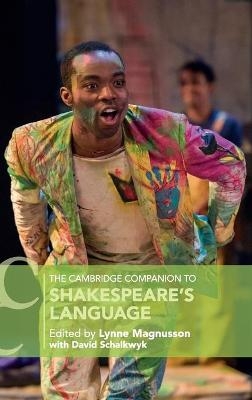
The Cambridge Companion to Shakespeare's Language
Cambridge University Press (Verlag)
978-1-107-13193-4 (ISBN)
The power of Shakespeare's complex language - his linguistic playfulness, poetic diction and dramatic dialogue - inspires and challenges students, teachers, actors and theatre-goers across the globe. It has iconic status and enormous resonance, even as language change and the distance of time render it more opaque and difficult. The Cambridge Companion to Shakespeare's Language provides important contexts for understanding Shakespeare's experiments with language and offers accessible approaches to engaging with it directly and pleasurably. Incorporating both practical analysis and exemplary readings of Shakespearean passages, it covers elements of style, metre, speech action and dialogue; examines the shaping contexts of rhetorical education and social language; test-drives newly available digital methodologies and technologies; and considers Shakespeare's language in relation to performance, translation and popular culture. The Companion explains the present state of understanding while identifying opportunities for fresh discovery, leaving students equipped to ask productive questions and try out innovative methods.
Lynne Magnusson is a Professor of English at the University of Toronto. Her ground-breaking articles and chapters treat topics such as the grammar of possibility in Shakespeare's language and the social rhetoric of Renaissance letters. She is the author of Shakespeare and Social Dialogue: Dramatic Language and Elizabethan Letters (Cambridge, 1999). David Schalkwyk is Professor of Shakespeare Studies at Queen Mary University of London. He is a leading Shakespeare scholar and author of Shakespeare, Love and Service (Cambridge, 2008) and Shakespeare, Love and Language (Cambridge, 2018).
Part I. Basic Elements: 1. Shakespeare and the problem of style Jeff Dolven; 2. Shakespeare's creativity with words Alysia Kolentsis; 3. The performative power of Shakespeare's language David Schalkwyk; 4. Verse and metre Oliver Morgan; 5. The dynamics of Shakespearean dialogue Lynne Magnusson; 6. Figures of speech at work Ruth Morse; Part II. Shaping Contexts: 7. Approaching Shakespeare through rhetoric Peter Mack; 8. Shakespeare and social languages James Siemon; Part III. New Technologies: 9. Digital approaches to Shakespeare's language Jonathan Hope; 10. Authorship, computers, and comparative style Hugh Craig; 11. Reading in time: cognitive dynamics and the literary experience of Shakespeare Amy Cook and Seth Frey; Part IV. Contemporary Sites for Language Change: 12. Writing for actors: language that cues performance Carol Chillington Rutter; 13. Language and translation Dirk Delabastita; 14. Popular culture and Shakespeare's language Douglas M. Lanier.
| Erscheinungsdatum | 08.08.2019 |
|---|---|
| Reihe/Serie | Cambridge Companions to Literature |
| Zusatzinfo | 2 Tables, black and white; 2 Line drawings, black and white |
| Verlagsort | Cambridge |
| Sprache | englisch |
| Maße | 157 x 235 mm |
| Gewicht | 610 g |
| Themenwelt | Geisteswissenschaften ► Sprach- / Literaturwissenschaft ► Anglistik / Amerikanistik |
| Geisteswissenschaften ► Sprach- / Literaturwissenschaft ► Literaturgeschichte | |
| Geisteswissenschaften ► Sprach- / Literaturwissenschaft ► Literaturwissenschaft | |
| ISBN-10 | 1-107-13193-6 / 1107131936 |
| ISBN-13 | 978-1-107-13193-4 / 9781107131934 |
| Zustand | Neuware |
| Haben Sie eine Frage zum Produkt? |
aus dem Bereich


